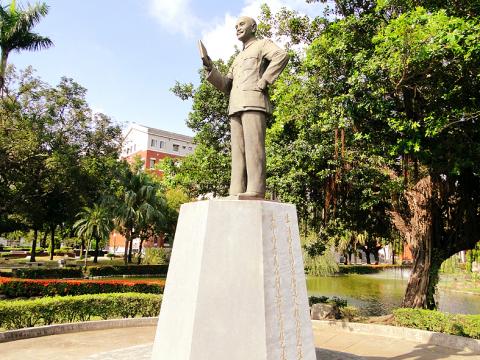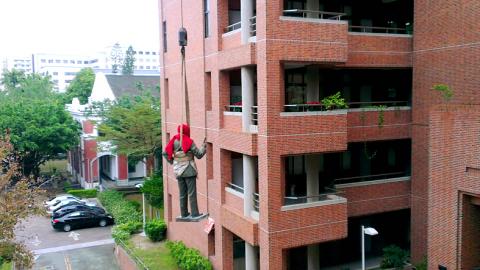The controversy over a bronze statue of fromer president Chiang Kai-shek (蔣介石) on National Cheng Kung University’s (NCKU) campus in Greater Tainan came to a close on Wednesday after the contentious item was relocated indoors.
The statue, which used to stand by Cheng Kung Lake, was removed to the school’s archives room early on Wednesday morning. The move was filmed by Chen Ting-yu (陳亭羽), a student in the Department of Taiwanese Literature.
The removal of the statue reflected the university’s willingness to acknowledge students’ calls for the institution to be anti-authoritarian, but the process could have been handled better, Chen said.

Photo: Meng Ching-tsu, Taipei Times
“The relocation should have been made public because it was a momentous event,” Chen said, adding that the school’s decision to remove the statue when students are preparing for their final exams “gave students the feeling that the school was trying to do it on the sly.”
In response to some students saying that the relocation of the statue should have been publicized instead of being low-profile, the school’s secretary-general, Chen Chin-cheng (陳進成), said that it had been better to be low-key about the removal of the statue because the issue had already caused a commotion inside and outside the campus, so the school did not want the relocation to cause another disturbance.
The statue is now on the eighth floor of the school’s archives on its Kuang Fu campus. As the statue is part of the university’s history, a plaque is to be made to explain its significance, Chen Chin-cheng added.

Photo: Meng Ching-tsu, Taipei Times
A heated debate at the school about the statue’s relocation erupted after a students’ art installation on Feb. 28 last year. A group of students staged the installation to mark the 65th anniversary of the 228 Incident in the hopes of raising public awareness about the horrific moment in the nation’s history so people could learn from past mistakes.
Members of student organization, the 02 Group (零貳社) — whose name is a phonetic translation of the word “protest” in Hoklo (commonly known as Taiwanese) — hung a sign reading “1947-2012” on the statue and placed the names of victims of the massacre around it.
The Incident refers to a massacre that sparked a massive 1947 nationwide uprising against the then-Chinese Nationalist Party (KMT) regime. The uprising was brutally crushed in a violent crackdown spearheaded by the state and also marked the beginning of the White Terror era.

‘ABUSE OF POWER’: Lee Chun-yi allegedly used a Control Yuan vehicle to transport his dog to a pet grooming salon and take his wife to restaurants, media reports said Control Yuan Secretary-General Lee Chun-yi (李俊俋) resigned on Sunday night, admitting that he had misused a government vehicle, as reported by the media. Control Yuan Vice President Lee Hung-chun (李鴻鈞) yesterday apologized to the public over the issue. The watchdog body would follow up on similar accusations made by the Chinese Nationalist Party (KMT) and would investigate the alleged misuse of government vehicles by three other Control Yuan members: Su Li-chiung (蘇麗瓊), Lin Yu-jung (林郁容) and Wang Jung-chang (王榮璋), Lee Hung-chun said. Lee Chun-yi in a statement apologized for using a Control Yuan vehicle to transport his dog to a

Taiwan yesterday denied Chinese allegations that its military was behind a cyberattack on a technology company in Guangzhou, after city authorities issued warrants for 20 suspects. The Guangzhou Municipal Public Security Bureau earlier yesterday issued warrants for 20 people it identified as members of the Information, Communications and Electronic Force Command (ICEFCOM). The bureau alleged they were behind a May 20 cyberattack targeting the backend system of a self-service facility at the company. “ICEFCOM, under Taiwan’s ruling Democratic Progressive Party, directed the illegal attack,” the warrant says. The bureau placed a bounty of 10,000 yuan (US$1,392) on each of the 20 people named in

The High Court yesterday found a New Taipei City woman guilty of charges related to helping Beijing secure surrender agreements from military service members. Lee Huei-hsin (李慧馨) was sentenced to six years and eight months in prison for breaching the National Security Act (國家安全法), making illegal compacts with government employees and bribery, the court said. The verdict is final. Lee, the manager of a temple in the city’s Lujhou District (蘆洲), was accused of arranging for eight service members to make surrender pledges to the Chinese People’s Liberation Army in exchange for money, the court said. The pledges, which required them to provide identification

INDO-PACIFIC REGION: Royal Navy ships exercise the right of freedom of navigation, including in the Taiwan Strait and South China Sea, the UK’s Tony Radakin told a summit Freedom of navigation in the Indo-Pacific region is as important as it is in the English Channel, British Chief of the Defence Staff Admiral Tony Radakin said at a summit in Singapore on Saturday. The remark came as the British Royal Navy’s flagship aircraft carrier, the HMS Prince of Wales, is on an eight-month deployment to the Indo-Pacific region as head of an international carrier strike group. “Upholding the UN Convention on the Law of the Sea, and with it, the principles of the freedom of navigation, in this part of the world matters to us just as it matters in the